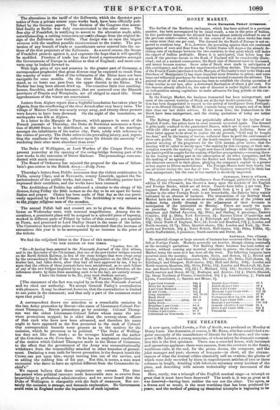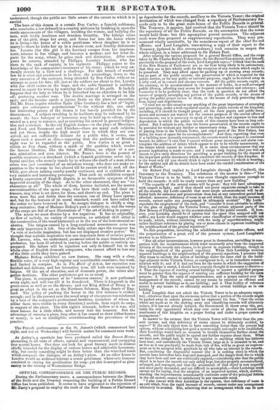THE THEATRES.
A new opera, called Loretta, a Tale of Seville, was produced on Monday at Drury Lane. The dramatist, of course, is Mr. Bunn, who has established a re- gular monopoly of the manufacture of libretti for his theatre; and the com- poser is Mr. Lavenu, a young musician, of whose talent for dramatic composi- tion this is the first specimen. There was a crowded house, with incessant and uproarious applause: there were encores, from the overture to the finale; vociferous calls, at the end, for the prima donna, the composer, and the joint manager and poet; showers of bouquets—in short, at the circum- stances of what the diurnal critics classically call an ovation; the glories of which were duly recorded by them in magniloquent articles of two or three columns in length, detailing with laborious accuracy every incident of the piece, and describing with minute technicality every movement of the music.
Here, surely, was a triumph of the English musical stage—a triumph so great that it must have been deserved? The truth is, it was as great as it was deserved—having been neither the one nor the other. The opera, as a drama and as music, is the most worthless that has been produced for years; and the method of getting up theatrical triumphs is beginning to be
understood, though the public are little aware of the extent to which it is carried.
The hero of this drains is a certain Don Carloe; a Spanish nobleman, who concludes a low debauch in a country alehouse by breaking in upon the
rustic amusements of the villagers, insulting the women, and bullying the Mien, with lordly insolence and drunken brutality. The hidalgo seizes one of the girls, drags her away, and forces her into the house where be is living—the house of a noble gentleman whose daughter he is to marry!—there he locks her up in a remote room, and forcibly dishonours her. Loretta (for this girl is the heroine) escapes from her imprison- Mient, returns to her -village, and becomes a mother; and her lover de- parts for the army, where he gains rank and distinction. After some years be returns, attended by Philippe, Loretta's brother, who has risen to the rank of captain; in his regiment. Philipp° comes to the knowledge of his commander's treatment of his sister; which be very na- turally resents by a blow and a challenge. For this breach of martial law he is tried and condemned to be shot; the proceedings, down to the very execution of the sentence, being attended by Don Carlos without an attempt to avert his fate; till, just as the soldiers are about to fire, Loretta with her child rushes on the stage, and the noble Spaniard is suddenly moved to repair his wrong by marrying the victim of his guilt. It luckily happens that the lady to whom he is betrothed has no objection to let him off; preferring another man. The double marriage is arranged on the spot; and the heroine carols a joyous finale on the place of execution. Did Mr. Bunn inquire whether Spain (like Scotland) has a law of " legiti- roatio per subsequens matrimonium " P—for without this, one small but interesting person of the drama is but lamely provided for by the denouement. A subject revolting in its incidents may be redeemed by its moral: the base betrayer of innocence may be held up to odium, repre- sented as a prey to remorse, and as receiving his reward in general indigna- tion and contempt. In the old English drama—in the plays of Messinger, and Ford, and Beaumont and Fletcher—there are many such subjects; and yet these, despite the high moral tone in which they are con- ceived, are not sufficiently delicate for a public who, it seems, can digest such a morsel as this,—supposing that the audience of Monday night was to be regarded as the public. Don Carlos is as great a villain as Don Juan, -without a spark of the qualities which render the famous libertine, like the Satan of Milton, an object of a cer- tain admiration and even interest. Mr. Bunn's hero is the poorest of possible creatures,—a drunkard (which a Spanish gentleman never is); a brutal ravisher, who meanly stands by to witness the death of a man whose crime was just resentment of an atrocious wrong; who does not make re- paration to the woman he has abused till he cannot avoid it; and, all the While, goes about talking namby-pamby sentiment, and is exhibited as a very amiable and interesting personage. That such an exhibition escaped *hearty expression of English disgust, is no favourable symptom of the improved morality of the stage. As to the other characters, they are " no characters at all." The whole of them, heroine included, are the merest conventionalities of the opera stage, who have their exits and their en- trances, sing what is set down for them, and there's an end. The piece is even more fiat and feeble than the common run of Drury Lane operas; Land, but for the lowness of its moral standard, would not have called for the notice we have bestowed on it. Its meagre dialogue is chiefly a sing- song recitative; that of Madame Bishop's part is entirely so; and the verses of the songs are full of new illustrations of " the art of sinking in poetry." The music we must dismiss by a few negatives. It has no originality, no flow of melody, no variety of expression, no artistical skill either in the construction of the vocal harmonies or in the use of the instrumental or- chestra. The fatigue caused by a long-continued monotonous noise was the only impression it left. One of the daily critics says the composer has 51a vein of melodic inspiration, but has not displayed creative power." We thought that melodic inspiration was one important form of creative power. Mr. Lavenu, who, we understand, possesses talent in some branches of his -profession, has been ill advised in coming before the public so entirely un- prepared. His failure will be injurious not only to himself but to the 'whole class of English dramatic composers, who cannot afford to lose any of the little credit they have gained.
Madame Bishop exhibited no new feature. She sang with a clear, flexible voice, of a very high register and considerable sweetness, but weak, 'and limited in compass. As in The Maid of Artois, her execution was finished and delicate, and her intonation true, till both were impaired by fatigue. Of the art of elocution, and of dramatic power, she seems alto- gether destitute. The other performers got on as usual. The piece, in consequence of its " immense success," is now performed every night, and will run till it be foundered. There is kingcraft in the green-room as well as on the throne; and our King Alfred of Drury is as great an adept in the art as the Northern Solomon, King Jamie of Eng- land. The policy of packing the house in the first instance is evident enough; and in the present case the usual army of clacqueurs was reinforced by a host of the composer's professional brethren, (numbers of whose fa- milieu faces were visible in every direction,) zealous, from esprit de corps, in support of the piece. The first night's triumph, hollow as it was, will draw houses for a little while, and money into the treasury. But the advantage of running a piece, long after it has ceased to draw either houses or money, is not so intelligible, notwithstanding the prevalence of the practice.



























 Previous page
Previous page